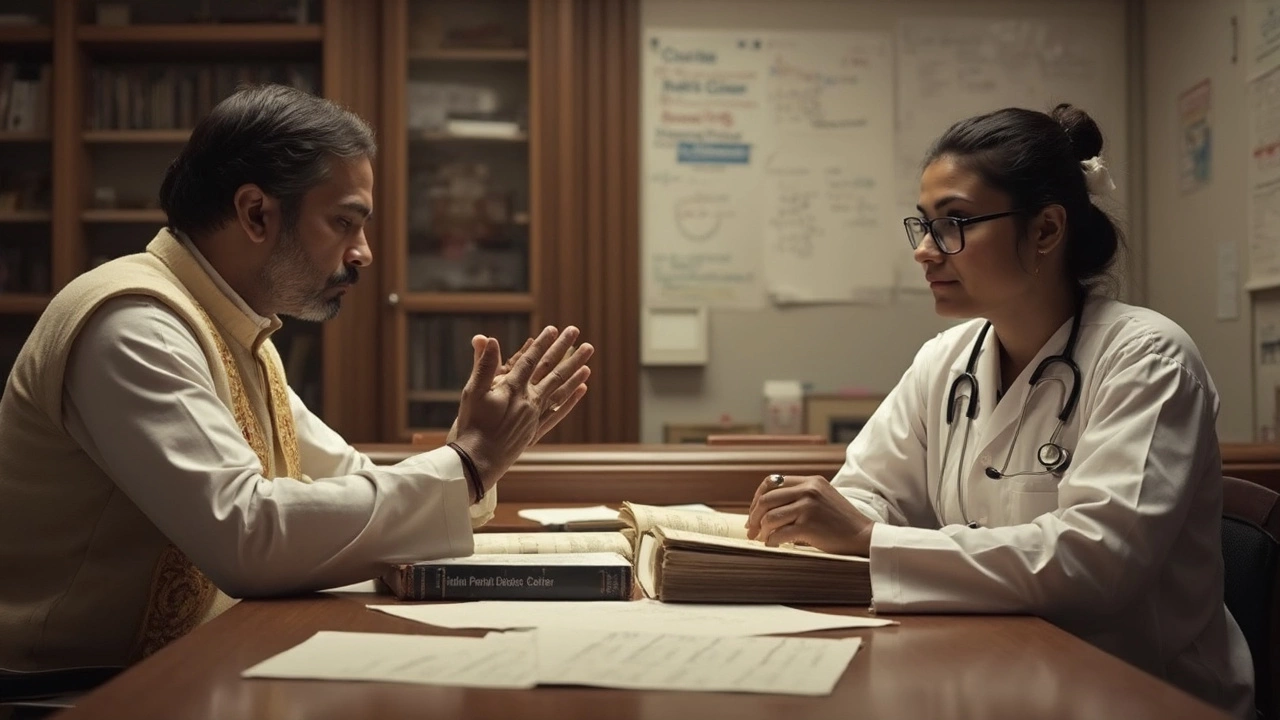So, you've got your eyes on a professional career, and you're probably already stressing about those infamous exams, the LSAT and the MCAT. This is where the real journey begins for aspiring lawyers and doctors. But how do you decide which mountain to climb first? Let's break down what each test entails and what might make one a bit thornier than the other.
First up, the LSAT, which is all about testing your logic and reasoning skills. You're asked to untangle arguments and figure out complex problems—skills you'll need in law school big time. But don't expect any math or science here; it's all words and logic games.
On the flip side, the MCAT is a beast in its own right, hammering away at your understanding of physical and biological sciences. It's less about memorizing and more about testing how you apply scientific principles to different scenarios. You'll need a good handle on chemistry, biology, and physics, with a side of critical thinking thrown in.
Both tests are challenging, no doubt, but they require different types of preparation and thinking. If you lean toward abstract reasoning, the LSAT might be your game. But if you're a science buff with a knack for problem-solving, the MCAT could be calling your name.
Understanding the LSAT
The LSAT, or Law School Admission Test, is your entry ticket into law schools. It's like the sorting hat for lawyers-to-be, but instead of magic, it's all about logic and reasoning.
The LSAT is made up of several sections that will test different aspects of your thinking. It typically includes Logical Reasoning, Analytical Reasoning (often called Logic Games), Reading Comprehension, and a Writing Sample.
- Logical Reasoning: This is where they're checking how well you can analyze and evaluate arguments. You’ll find short passages followed by questions that get you thinking critically.
- Analytical Reasoning: Also known as Logic Games, these puzzles test your ability to understand structure and order. It’s all about scenarios and your ability to decipher them. Think of them as brain teasers on steroids.
- Reading Comprehension: Just like it sounds, this section checks if you can understand complex texts. It's about finding the main ideas or understanding the author's tone and intent.
- Writing Sample: While this one isn’t scored, it’s sent to law schools to give them a sense of your writing abilities. You’ll have to draft an essay arguing for one of two options based on some given facts.
Scoring for the LSAT ranges from 120 to 180, with the average hovering around 150. Aiming for the higher end can seriously bolster your law school applications, so each point above average counts.
The test is generally offered multiple times a year, and the process is pretty standardized. Investing time in prep courses or study materials can be a game-changer. Unlike the MCAT, which dives into science, the LSAT is purely about critical thinking and logical deduction, so it's about sharpening a very different set of skills.
Decoding the MCAT
Diving into the MCAT can feel a bit like trying to solve a puzzle where each piece matters a lot. This test isn't just about cramming facts but really about showing you know your stuff when it comes to science. It's no secret that the MCAT tests major subjects like biology, chemistry, psychology, and physics, but what many find surprising is the focus on critical analysis too.
A typical MCAT exam runs for about 7.5 hours, including breaks. Yep, it's a marathon—not a sprint. Here's how the sections break down:
- Biological and Biochemical Foundations of Living Systems
- Chemical and Physical Foundations of Biological Systems
- Psychological, Social, and Biological Foundations of Behavior
- Critical Analysis and Reasoning Skills (CARS)
Each section has its own quirks. Take the CARS section, for instance, which challenges you to think deeply about passages that don't require scientific knowledge but do need strong analytical skills. That's a curveball if science is your main focus!
"The MCAT is not merely a test of knowledge but a demonstration of your capability to think like a scientist," says Dr. Janet McCoy, an advisor for pre-med students.
It's also worth noting that the MCAT is a computer-based test, so getting comfy with digital exams is a must. Practice tests are your best friend here; they'll help you get the hang of the timing and format.
As for preparing, it's all about balance and strategy. Some folks swear by study groups, while others are all about those late-night solo study sessions. Whatever floats your boat, just remember, getting a good MCAT score is a must for medical school applications, so give it all you've got.
To put things into perspective, here's a quick look at how scores are distributed:
| Section | Score Range |
|---|---|
| Each of the four sections | 118-132 |
| Total Score | 472-528 |
Shooting for a balanced score across all sections is key, but don't panic if one section feels tougher than the others—it's common, and admission boards usually look at the whole package.

Comparing the Difficulties
When it comes to figuring out which exam is tougher—LSAT or MCAT—it's like comparing apples and oranges. Each test targets a different skill set and demands its own kind of dedication and prep.
On one hand, the LSAT leans heavily on logic games, reading comprehension, and analytical reasoning. The trickiest part? Time management. On each section, those clock hands seem to spin extra fast. It's a test that favors those who can think on their feet and untangle tricky arguments quickly.
On the other hand, the MCAT is more of a marathon than a sprint. Expect to spend around seven and a half hours tackling sections on biological sciences, physical sciences, and critical analysis. For science lovers, this might be a fun challenge, but it's not just about what you know—it's about how you apply that knowledge in complex situations.
Now, here's a fun fact: about 60% of folks retake the MCAT to improve their scores, whereas for the LSAT, nearly 40% opt for a redo. This gives a peek into the perceived difficulty and the pressure to achieve that dream score.
The LSAT's focus is more on quick thinking and verbal skills, while the MCAT demands in-depth scientific understanding and endurance. So if timed logic puzzles bug you, the LSAT might feel tougher. But if a deep dive into physics and biology isn't your jam, the MCAT can seem like a monster.
In conclusion, the tougher test is subjective. It depends on where your strengths lie and what you're naturally inclined towards. Want to be a lawyer or a doctor? That's the real question guiding your choice between these two challenging paths.
Choosing the Right Path
So, it's decision time, and you're wondering whether to go for the LSAT or the MCAT. This choice isn't just about which exam is harder; it's about which path aligns with your future goals and strengths. Here's what you should consider when picking your path.
Firstly, think about your long-term career ambitions. If tackling big legal battles or defending the innocent excites you, the LSAT might be your best bet. You'll spend your days crafting arguments and dodging objections like a pro. But if you're more amazed by the human body, diseases, and medical discoveries, the MCAT is your ticket. Imagine diagnosing puzzling symptoms and saving lives.
Next up, assess your current academic strengths. Are you a whiz at logical puzzles or thrive in debates? That's where the LSAT can play to your strengths with its focus on reading comprehension and logical reasoning. However, if you loved dissecting frogs in biology and aced chemistry labs, then the science-heavy MCAT should fit right in your comfort zone.
Another thing to weigh is what you're willing to live through during your prep time. LSAT preparation often involves drilling logic games and practice tests, whereas the MCAT will have you deep-diving into scientific textbooks and brushing up on everything from physics to psychology.
Moreover, consider any potential financial implications. Both law and medical schools have hefty price tags, but they're on different levels. Medical school can be particularly costly and lengthy, often leading to years of residency even after graduation.
Here's a snapshot to help you weigh your choice:
| Aspect | LSAT | MCAT |
|---|---|---|
| Focus | Logical Reasoning, Reading Comprehension | Biological Sciences, Physical Sciences |
| Preparation Style | Practice Tests, Logic Games | Textbook Study, Science Labs |
| Career Path | Lawyer, Legal Services | Doctor, Healthcare |
| Time & Cost | Shorter, Moderate Tuition | Longer, Higher Costs |
At the end of the day, the right path is the one that not only fits your skills but also excites you to wake up every morning ready to tackle new challenges. Both the LSAT and MCAT are gateways to fulfilling careers that change lives, be it in the courtroom or the operating room.
